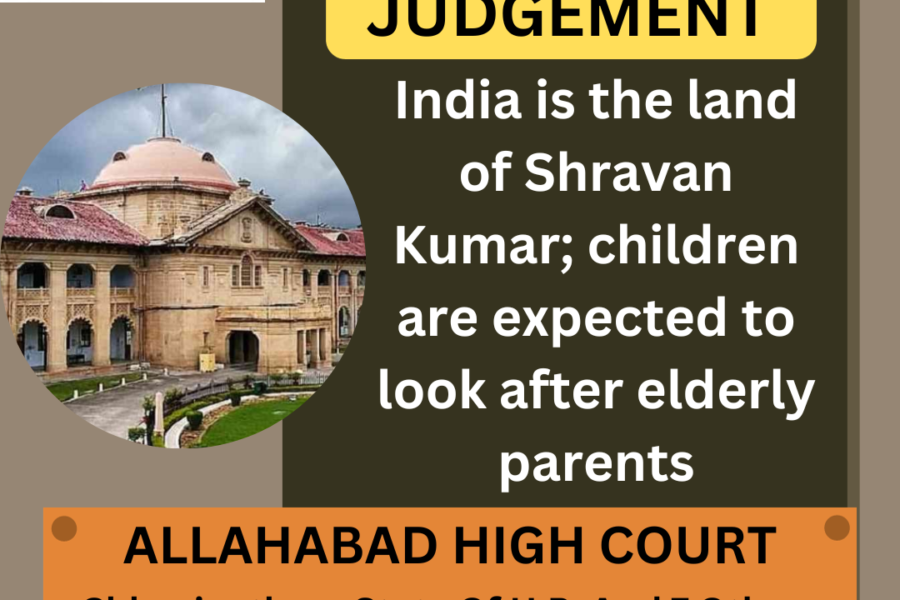Every senior citizen parent needs plenty of company, love, and care from their children as they age. It is a basic and fundamental requirement.
Relationships between parents and children are among the most significant and intricate in life. They serve as the cornerstone of a child’s identity and growth. Parents are the ones who give their children a secure atmosphere in which to develop into better, more responsible adults.
Nonetheless, it is clear that important family values are being abandoned as humanity advances in the battle for survival. Nowadays, many view caring for and supporting parents with love and care as a hardship, although in the past it was considered a moral obligation of a child.
General Responsibilities towards Parents
consist of tending to their physical health, offering them emotional support, and honoring their choices and independence. Furthermore, it’s critical that kids actively participate in honest dialogue with their parents and express gratitude for all of their sacrifices. Individuals can help to maintain family values and fortify the link between generations by fulfilling these obligations.
Senior parents’ physical and emotional well-being is negatively impacted when they experience loneliness and neglect, which is a very depressing sensation. Their life expectancy is consequently adversely affected.
Legal Responsibilities
There are legal requirements and social norms in many cultures for adult children to assist and take care of their aging parents. Usually, these responsibilities are categorized as filial responsibilities.
Filial obligation laws, which are present in certain nations or states within nations, typically mandate that adult children support their parents financially in the event that they are unable to do so. These laws are not generally applicable and differ greatly in their scope and execution.
It is significant to remember that not all jurisdictions have laws pertaining to filial responsibility and that enforcement of these laws may be spotty or nonexistent in those that do. Therefore, rather than being based on legally mandated duties, the obligations that people have to their elderly parents are more deeply ingrained in cultural and moral expectations in many nations.
According to Indian Law, children are under an inescapable legal duty to take care of their parents when they are in the evening of their life and do not have a sufficient source or support of their own. The parents who are not being maintained by their adult child can enforce their right by filing a case under section 125 of CrPC.
A Magistrate of the first class may, in accordance with the terms of this section, require the adult children to provide a monthly allowance for their parents’ maintenance at a rate the Magistrate deems appropriate if proof of such neglect or refusal is provided. This clause applies to people of all castes and religions in all Indian states.
Making the laws for the maintenance and welfare of old parents or senior people more effective is the goal of the 2007 Maintenance and Welfare of Parents and Senior People Act, which is the most important law that outlines the legal responsibility of children towards their parents in India. It law requires adult children to support their parents. The legislation covers biological parents as well as adoptive and stepparents.
The state under this act is authorized to set up maintenance tribunals for the elderly. Parents can apply to a maintenance tribunal seeking a monthly allowance from their children or legal heirs. In the 2018 amendment, the government has attempted to widen the definition of “children” to include daughter-in-law and son-in-law.
Hindu Adoption and Maintenance Act 1956
Parents, whether legal or illegitimate, are obligated by Section 20 of the Hindu Adoption and Maintenance Act 1956 to support their kid until the child reaches adulthood. The provision also states that if a parent is too old or unable to care for themselves, the kid is responsible for providing for them. In this section, a stepmother without children is also regarded as a parent.
CASE LAW
Chhavinath vs. State of U.P. and 7 Others 2023
While dealing with a writ petition filed by an 85-year-old man accusing his sons of harassing him and dispossessing him of his holding, the Allahabad High Court recently observed that the traditional norms and values of the Indian society emphasize the duty of taking care of elders.
“Our nation has been a land of culture, value, and ethics,” stated the division bench of Justices Mahesh Chandra Tripathi and Prashant Kumar. It’s the home of the fabled “Shravan Kumar,” who destroyed his parents’ old, blind lives. The responsibility of caring for one’s elderly is emphasized by the customs and values of Indian civilization.
The bench emphasized that obligations owed by children to their parents were viewed as debts in our traditional society.
“The children are expected to look after their elderly parents properly which is not only a value-based principal but a bounden duty as mandated by law,” the division bench stated.
It noted that the Parliament passed the Maintenance and Welfare of Parents and Senior Citizens Act 2007 in order to achieve this goal of upholding the dignity and respect of senior citizens in old age.
“When an old parent gifts his hard-earned property, at the time when he is old, weak, ill, almost not earning, dependent & weary, it is not only expected but the donee children are both under moral and legal obligation and bounden duty to take care of their donor parent”, the judge stated.
The court determined that there would be no benefit to keeping the writ petition open in this particular case.
As a result, the court dismissed the petition and instructed the relevant Sub-Divisional Magistrate to determine the petitioner’s representation strictly in compliance with the law after hearing from all parties involved and within six weeks of the date on which a certified copy of the order was produced.
Adv. khanak sharma (D\1710\2023)

